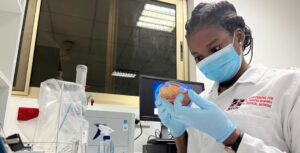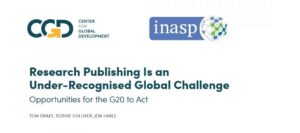Stand out from the crowd with an ORCID iD
Alice Meadows of ORCID explains how researchers can get unique identifiers and why they are important in helping research contributions to be attributed and discovered.
This post also appears on our AuthorAID website. INASP’s AuthorAID project helps researchers get their research published through online and face-to-face training, online resources and mentoring. The AuthorAID community is free to join and now includes over 11,000 researchers from around the world.
Researchers the world over face many of the same challenges: complying with funder and institutional requirements; ensuring their research contributions are discoverable and accessible – and getting recognition for them; ensuring; measuring and reporting on their impact. But some of these challenges can be especially acute for southern researchers, such as those participating in INASP’s AuthorAID programme, who typically have less access to the research infrastructure that their northern peers benefit from.
ORCID (Open Researcher and Contributor Identifier) is part of that research infrastructure; as a global, non-profit, community-drive organization, we are set up to help address some of these challenges for all researchers, wherever you’re based.
Name ambiguity, for example, can be an issue in southern countries where commonly shared names, multiple family names, and transliteration problems, are often typical. Making sure that all your research works are correctly linked with you is critical to ensuring you get recognition for them – and that they are discoverable by others. A recent ORCID survey found that respondents in Africa, Asia, and Latin America were 10% more likely to be concerned about misattribution of their work than researchers in the rest of the world.
By assigning researchers a unique digital identifier – one you can carry with you throughout your whole career, irrespective of name, employment, career, or other changes – ORCID helps ensure that your research is unambiguously connected to you. Simply link your ORCID record with your research works (and/or with online profile systems where you’ve already added or claimed your works, such as Mendeley or ResearcherID), and use your ORCID iD whenever prompted to do so, for example in grant applications, manuscript submission, and research information systems.
Another challenge for many southern researchers is getting recognition for your many important contributions to the ‘grey’ literature – reports and other works that aren’t, and often can’t be, freely available – as well as to local and national, rather than international, publications.
Again, ORCID can help. You can connect all kinds of research outputs to your ORCID iD. Journal articles, book chapters, datasets, and other publications that have been assigned a DOI are especially easy to connect, through several Search & Link wizards, available through major databases such as Scopus, Web of Science, the Modern Language Association, International Bibliography, PubMed Central Europe, as well as with Crossref and DataCite.
This process just got even easier too because Crossref can now automatically update your record (with your permission) every time you use your ORCID iD when publishing anything that it provides a DOI for. And DataCite will shortly implement the same functionality for datasets with a DataCite DOI. But you can also readily connect any other research outputs to your iD, including reports, dissertations, presentations, and more.
Registering for an ORCID iD has many other benefits – and it is quick, easy, and free. You may already have one, since AuthorAID requests ORCID iDs when you sign up to its online courses, apply for workshop or travel grants, or apply to be a mentor or mentee. If not, I hope you’ll take this opportunity to register [LINK TO https://orcid.org/register] now.
And once you have an iD, make sure you make the most of it. First and foremost this means using it when prompted to do so – typically where you see this image . You should also log into your ORCID account and take a few minutes to add your preferred publishing name and your name variations, as well as your affiliation(s); both will help to ensure you are correctly attributed. If you want to increase the discoverability of your works, you may also use tools in ORCID to connect your iD to your existing research activities in external databases including Europe PubMedCentral, Scopus, and Web of Science.
For more information about ORCID see also this recent post.




